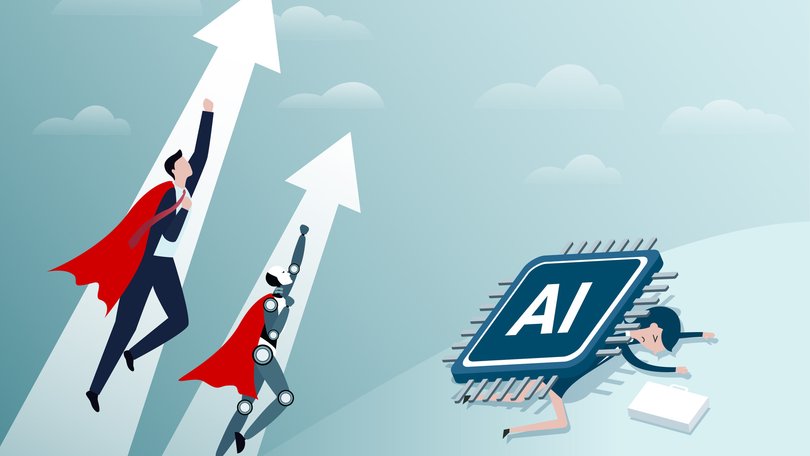Tech pioneer Dario Amodei warns AI surge could slash entry-level white-collar jobs by 50 per cent
As a big business lobby group calls for Australia to lean hard into artificial intelligence, the founder of one of the largest AI firms warns it could result in 50 per cent job loss for youth.

Australia’s peak business lobby is betting big on artificial intelligence, pitching it as the productivity fix we’ve been waiting decades for. But as the country grapples with how to adopt the tech, a chilling forecast is emerging: up to one in five people could be out of work.
The man delivering the warning? Not a sceptic, but a pioneer and builder of the very technology he says threatens the white-collar world.
Dario Amodei, CEO of Anthropic — the San Francisco firm behind Claude, one of the most powerful generative AI systems — has warned of the deep risks of the coming revolution: mass job losses, especially for younger workers.
Sign up to The Nightly's newsletters.
Get the first look at the digital newspaper, curated daily stories and breaking headlines delivered to your inbox.
By continuing you agree to our Terms and Privacy Policy.Mr Amodei told Axios the world could be facing 10 to 20 per cent unemployment within five years, warning that 50 per cent of entry-level white-collar jobs in tech, finance, law and consulting are in danger of being wiped out.
“Most of them are unaware that this is about to happen,” Mr Amodei said, referring to the workforce. “It sounds crazy, and people just don’t believe it.”
Mr Amodei’s comments, published Sunday, come as the Business Council of Australia released an ambitious blueprint to embed artificial intelligence across the economy.
The BCA describes it as a “national priority” that must be “seized with urgency”, warning the country must “make big moves immediately to ensure we do not miss the opportunity.”
Goldman Sachs estimates that there will be $US1 trillion spent on AI in the next few years. Stanford University estimates $US109b went into US-based AI companies last year, and that was before the $US250b of investment in the pipeline from the three big tech firms as they build ever bigger data centres.
Where the money goes, the innovation follows, which is why the BCA is all in on supporting the technology.

The BCA’s 2025 Accelerating Australia’s AI Agenda report is steeped in optimism. It outlines a three-year plan to embed AI into public services, boost adoption among small businesses, and overhaul the country’s skills pipeline. The report describes AI as a “general-purpose technology” akin to electricity — capable of lifting national productivity, improving services, and creating entirely new industries.
Yet it acknowledges that Australia has already missed the first big wave of AI development — generative language models — and must now catch up in a new phase dominated by “agentic AI”: systems that can operate autonomously, set goals and execute complex tasks with minimal human input.
That same shift is at the centre of Mr Amodei’s alarm. In his view, the development of agentic AI — capable of writing code, managing workflows, analysing legal and financial documents, and performing customer service — will lead to employers quietly replacing junior staff in droves.
“We, as the producers of this technology, have a duty and an obligation to be honest about what is coming. I don’t think this is on people’s radar,” he told Axios.
The consequences could be enormous.
Silvia Griselda, Research Manager at the Education and Human Capital Unit of think tank e61, said many AI applications focus on automation rather than augmentation. That risks displacing workers without delivering broad-based productivity or wage gains.
“We’ve seen this before — during the Industrial Revolution and the decline of US manufacturing — where technology shocks caused deep regional and demographic disruption. Outcomes depended largely on whether workers could retrain and adapt,” she said.
Unions are watching closely.
“Artificial intelligence being adopted across the workforce has the potential to improve our working lives and increase the number of jobs,” ACTU assistant secretary Joseph Mitchell said.
“But there are significant risks for workers if we don’t get the AI transition right and for AI to be adopted safely and fairly, workers need to be part of the story,” Mr Mitchell said.
“We all will need to invest in training, development and retention to maximise the benefit. We also need to ensure there are proper safeguards against the harmful and malicious uses of AI that result in damage to Australian industries and working conditions.”
Worker displacement can have lifelong consequences, with e61 research finding that coal workers made redundant as part of the energy transition had incomes 50 per cent lower four years later.
“There’s a real risk of long-term wage scarring if AI leads to sudden displacement, particularly in routine white-collar roles. The degree of scarring will depend on when and where the job losses occur, and on the capacity of affected regions to support retraining and re-employment. If reskilling doesn’t keep pace with displacement, the long-term effects could be severe,” Ms Griselda said.
Not getting onto the ladder at all is a consequence that society may not be prepared for. Recently, LinkedIn’s chief economic opportunity officer Aneesh Raman wrote in the New York Times that AI was “breaking the bottom rungs of the career ladder”, closing off the potentially tedious but critical entry level jobs that are crucial to developing skills.
The Business Council of Australia acknowledges that while AI has the potential to unlock massive productivity gains, it also presents a serious risk of leaving segments of the workforce behind. The Accelerating Australia’s AI Agenda report warns that Australia must avoid a two-speed labour market, where those without digital skills are shut out of opportunity.
It calls for a “National AI Skills Compact” — a formal partnership between government, industry and education providers — to align training with employer demand, scale up microcredentials, and expand apprenticeships. The report stresses that AI literacy must start early and be embedded at every stage of learning, from schools to universities and vocational training, with a focus on making the existing workforce AI-capable through short, accessible retraining programs.
The BCA points to Stanford University research that suggests AI boosts productivity and in most cases, helps narrow the gap between low- and high-skilled workers.
The report also suggests that half of all companies using AI reported cost savings, particularly in areas like operations, supply chain management and software engineering. Australia’s banks are certainly seeing that. Both CBA and ANZ have told investors AI was increasingly performing the role of software developers.
That may be a good thing for productivity as it drives out costs and perhaps raises revenue. But that does not mean the workers will be the beneficiary.
“Productivity gains from AI won’t necessarily translate into broad-based wage growth. We may see rising productivity alongside stagnant or even falling wages for many workers. This happens when technology makes production more efficient, but not because workers themselves are doing more or contributing more. That’s a recipe for greater income inequality, as the gains accrue to capital owners and a narrow segment of high-skilled labour,” Ms Griselda said.
Anthropic’s CEO shares that fear and worries the the public only realises it when it’s too late.
“You can’t just step in front of the train and stop it,” Mr Amodei says.
“The only move that’s going to work is steering the train — steer it 10 degrees in a different direction from where it was going. That can be done. That’s possible, but we have to do it now.”

